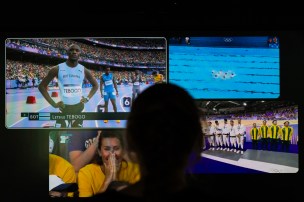Published on
PWHL championship series revolves around former Northeastern star Aerin Frankel
Frankel made 30 saves Sunday to lead Boston to a 4-3 win at the Tsongas Center in Lowell, Massachusetts. Game 2 of the best-of-five series is 7 p.m. Tuesday.
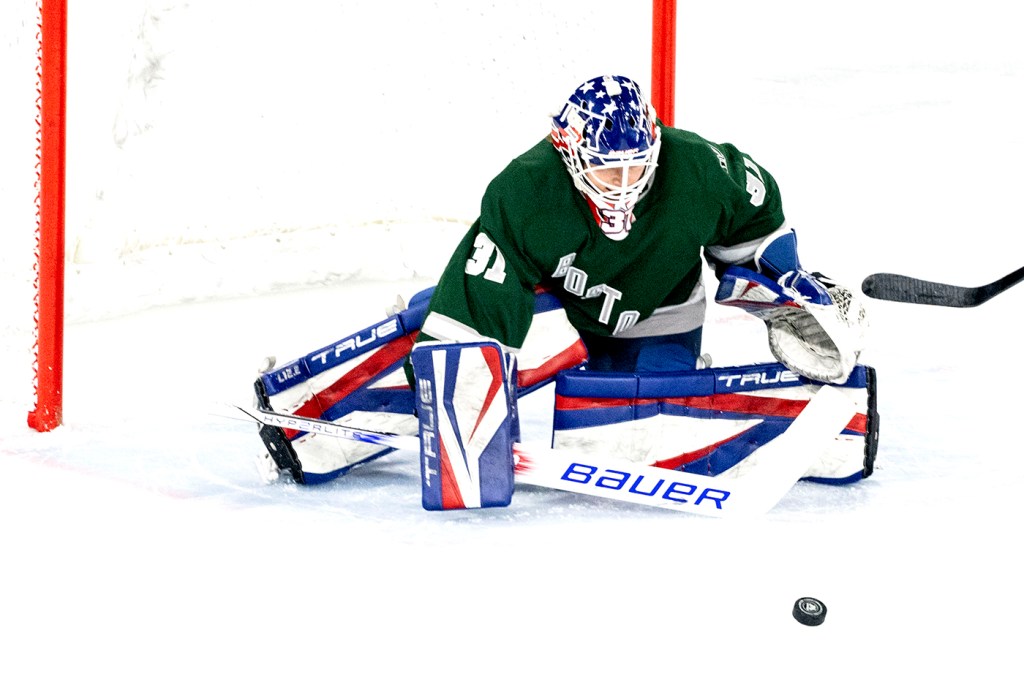
Northeastern University women’s hockey coach Dave Flint was watching Aerin Frankel, his former goaltender, with nostalgia and wonder.
The inaugural playoffs of the new Professional Women’s Hockey League were underway and Frankel’s team, PWHL Boston, was a surprise semifinalist. It was a comfortable role for Frankel — the lifelong underdog supposedly undersized for her position — who led from the back with startling performances as Boston swept favored Montreal in three overtime games.
It was onto the PWHL championship series for Frankel and her teammates.
And Frankel picked up where she left off. In Game 1 against Minnesota on Sunday night Frankel made 30 saves to lead Boston to a 4-3 win at the Tsongas Center in Lowell, Massachusetts.
Game 2 is 7 p.m. Tuesday, also at Tsongas.
Minnesota also features a pair of former Northeastern stars in Kendall Coyne Schofield (the national player of the year in 2015-16 as a Husky) and Denisa Krizova. But the league’s best-of-five championship round, which can be streamed free via YouTube, is revolving around the 5-foot-5-inch Frankel.
“She always feels like she has something to prove to everybody,” says Flint, who coached Frankel for five record-setting years as a Husky. “That’s what makes her so good. She never rests on where she’s at, she’s always trying to be better, always trying to prove people wrong. And time after time she does that.”
The PWHL semifinals were deja vu for Flint, who watched Frankel make 53 saves in Game 1 while her visiting team came back for a 2-1 win despite being outshot, 54-26. It was more of the same in Game 2 as Frankel made 57 saves in almost two hours of action as Boston won, 2-1, in the third overtime period, silencing the Montreal crowd of 10,172 fans.
Desperate Montreal grabbed a 2-0 lead in Game 3. But Frankel held her ground, stopping a pair of breakaways while Boston recovered for a 3-2 OT victory — with her former Northeastern teammate Alina Mueller assisting on the winner.
“Tremendous play by her,” Boston coach Courtney Kessel said of Frankel, who made 142 saves while yielding four goals in the series. “She’s a tremendous goalie that can make huge saves. She’s tiny, but man, she plays like a huge goalie — just can’t get that puck by her. We wouldn’t be here without her.”
Frankel’s leadership under pressure reminded Flint of the years of demanding work that helped her become one of the world’s top goalies.
“People always ask me when I recruit and coach goalies, what do I look for?” says Flint, a former college goaltender himself. “A lot of goalie coaches will give you some technical answer for it. But for me it’s do they stop pucks? And do they compete?
“Aerin’s not the prettiest at stopping pucks,” Flint says. “But she does it time after time after time. And she’s one of the most competitive people I’ve ever met when you talk about hating losing and hating getting scored on. That’s what makes her special — along with obviously being an amazing athlete.”
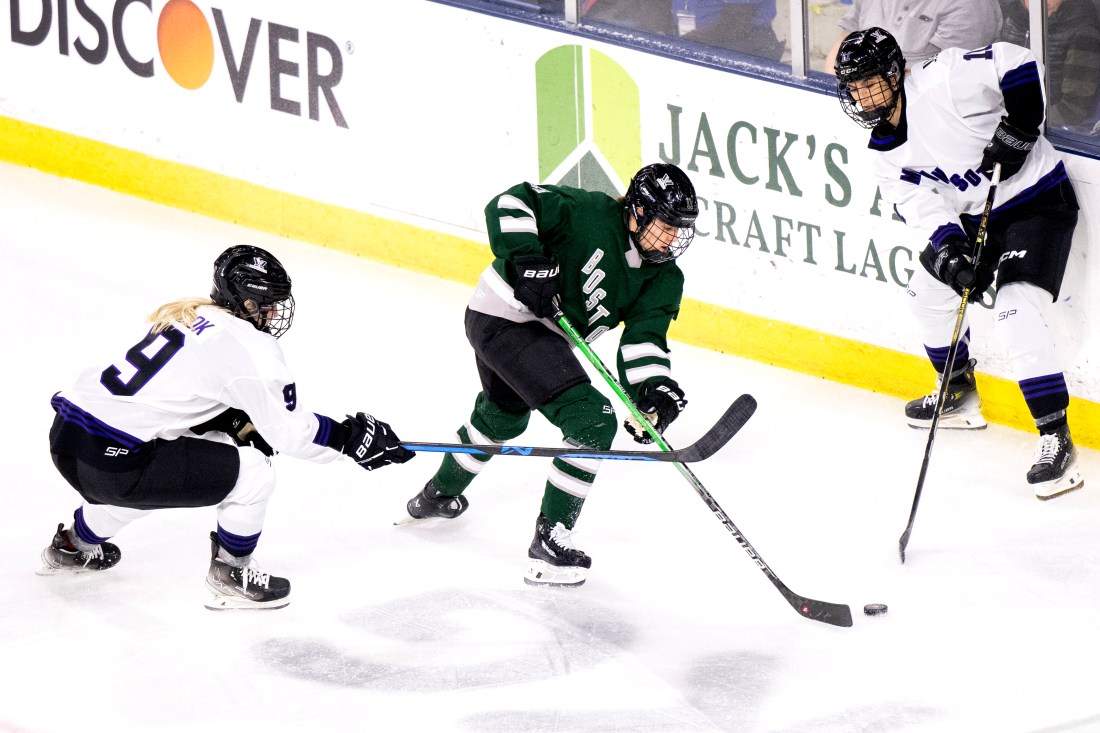
Frankel has succeeded in applying the lessons from her past that have helped her to persevere and triumph.
“It was a long season and it’s not going to be perfect,” Frankel says. “There’s going to be adversity for every team. But I think it’s most important that we’ve found our style and our way now because it’s a time you want to be playing your best hockey.”
Turns her underdog size into strength
Frankel was not a top recruit coming out of high school for two reasons: She played for powerhouse Shattuck-Saint Mary’s of Minneapolis, which limited the number of shots she faced; and she was considered small for the position.
Frankel turns her size into a strength by playing aggressively. She routinely steps out from the net to cut off shooting angles — which means reacting that much more quickly to shots without concern for how she looks.
She grew up playing boys hockey in Chappaqua, New York, and went all-in on her hockey career as a high school sophomore when she transferred to Shattuck, a boarding school that deepened her commitment and empowered the sense of independence that every goalie needs.
“I was leaving home at a pretty young age, but I think that’s a sacrifice that a lot of young players make to put themselves in the best position to succeed and get committed to a Division 1 school,” Frankel explained while she was starring at Northeastern. “It’s not for everyone. I think everyone has times where they’re homesick or they wish they could fly home to see their parents, but the hockey schedule doesn’t permit it.”
Flint remembers turning to freshman Frankel the day before a game against the nation’s top-ranked team at a tournament in Washington, D.C.
“I looked at her and said, ‘Hey, you want to play against Wisconsin tomorrow?’” Flint recalls. “She goes, ‘Yeah, I guess so.’ I started her the next day against the No. 1 team in the country and we beat them, 3-2. At that point I was like, ‘this kid is for real.’”
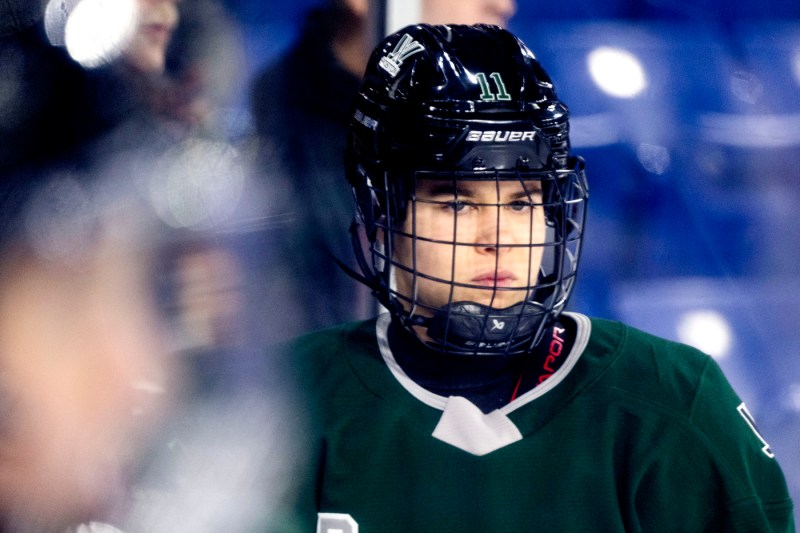
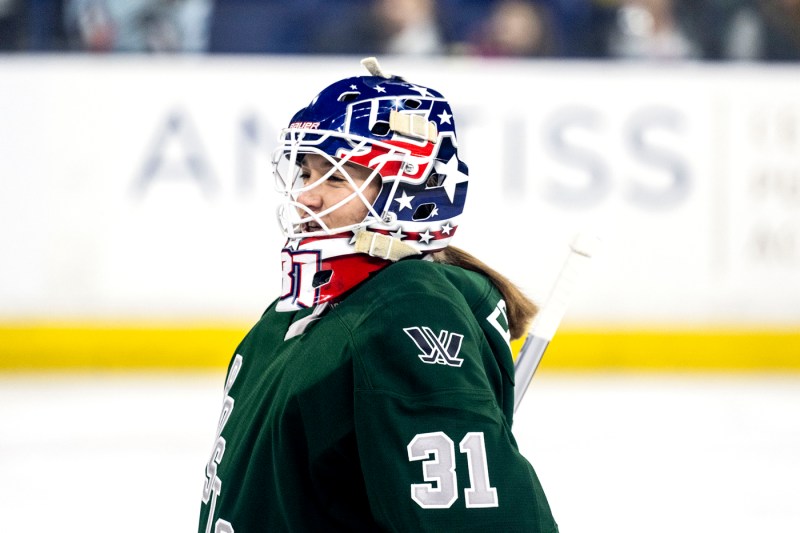
After the Huskies went .500 in conference play that season, Frankel won four straight one-goal games in the Hockey East playoffs to help lead Northeastern to the NCAA Tournament. She would leave Northeastern in 2022 with an 18-0 record in Hockey East tournament play and five straight NCAA tournament appearances.
Frankel earned the Patty Kazmaier Memorial Award as the national player of the year in 2021. She was the inaugural winner of the national goalie of the year award for two years running. She helped lead the Huskies to the Women’s Beanpot in 2020 and she holds Northeastern records with 3,349 saves, 39 shutouts and 139 wins.
All of that success set the stage for this championship run in what will go down as a historic season for women’s hockey.
“It’s a really special thing to be a part of,” Frankel says. “This year has been amazing from the fans to the venues that we’re playing in — just how amazing all the hockey has been and the level of competition. To be able to say that we’re advancing to the championship is not only really exciting for us and for Boston, but for women’s hockey and the sport.”
Three wins from the Walter Cup
Frankel had to adapt to the PWHL’s unique style of play — the new league is more physical and talented and altogether faster than NCAA Division 1.
“For goalies in general the biggest thing is the speed,” Flint says of the six-team PWHL. “And then you look at how good the players are — all of them are good shooters. In college your top two lines are elite, but here everybody’s elite. Everybody’s an amazing player.
“They shoot the puck harder, more accurately, they’re faster and they think the game better,” Flint says.
Boston had opened the season as potentially the most talented and balanced team in the PWHL. But the pieces didn’t fit somehow, forcing trades and lineup changes in search of better chemistry.
Flint offered Frankel advice amid a four-game losing streak in February.
“I think everybody went through some growing pains early on, figuring things out,” Flint says. “We talked at one point — they’d lost some games and she was frustrated — and I said, ‘You’re not used to losing and that’s a good thing. Now you’re going to learn how to process that. The most important thing when you’re in a losing streak and the team isn’t playing well is to not stay in that rut for too long. Find a way to get out of it.’”
“She steadily figured it out and worked through some tough stretches.”
Frankel finished third among league goalies in the regular season with a 2.00 goals against average and a .929 save percentage.
“It’s a completely different game than the college game,” Frankel says. “There’s so much talent in college hockey, but when you get to this level you can’t take a second off because your opponent’s going to make you pay for it.
“Talking with [Flint] was a little bit of a refresh on how cool it is to be here and understanding that goals are going to go in. This is a whole different level and it’s about just continuing to get better and watching film and working on things that I can work on, but also not holding myself to an unrealistic standard.”
Mueller — who joined Boston as the No. 3 overall draft pick following a career in which she became Northeastern’s all-time leading scorer — was also having to adapt to the hard-hitting style as well as an evolving role within her team.
“Alina went through some growing pains in adapting to the physicality of it,” says Flint, who suggests the PWHL should consider policing checking a little bit more severely in order to reduce player injuries. “She’s one of the best players in the world and she can play at that speed all day long. She’s really stepped up down the stretch — she’s playing great and with a lot of confidence.”
Mueller led her team in scoring with 16 points (11 assists) in 24 games. She scored goals in each of Boston’s final two regular-season games to qualify for the playoffs.
“It’s different for everybody,” says Mueller, who is among three finalists for the PWHL’s rookie of the year award. “You don’t know how to put a team together — if you need 10 superstars, if you need 10 grinders — and it took a while to figure out the lines. But everybody’s been buying in since the beginning and we’re very lucky to come to this rink every day with the people we have in this locker room.”
The league paused play in April as Frankel, Mueller and other PWHL stars competed in the IIHF Women’s World Championships in Lake Placid, New York. Mueller scored two goals with two assists for Switzerland. Frankel won a silver medal as the No. 1 goalie for USA Hockey.
Frankel and Mueller returned to Boston and suddenly their team was struggling no longer. They enter the finals on a 7-0-1 tear and needing just three more wins to become the first team to raise the Walter Cup that goes to the league champion.
“Right now we are in the middle of trying to win so you don’t really process what’s going on,” Mueller says. “But I’m sure after the season, no matter what happens, we’ll look back and see how many people we were able to inspire and will continue to inspire.
“I would have never thought that it’s going to be such a cool experience, just the whole season. Just how much we grew, how much we had to adapt and the challenges we faced — it made us better people on and off the ice. It’s truly amazing that we’re playing for the Walter Cup. We’re such competitive women, all we want to do is win and we’re doing that together. It is really fun.”
Ian Thomsen is a Northeastern Global News features writer. Email him at i.thomsen@northeastern.edu. Follow him on X/Twitter @IanatNU.







